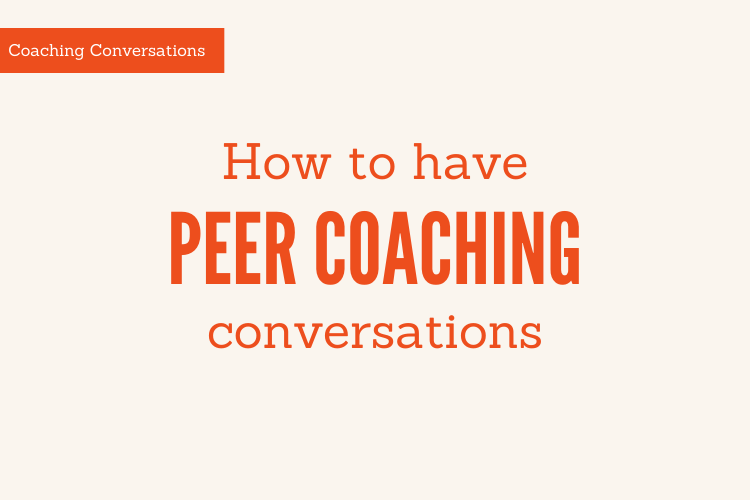
Peer coaching conversations can be more relaxed than those with a professional coach, but don't shy away from applying some structure, for example by following your Voco Talking Points. By thinking of your conversations as mutual coaching sessions, you can give yourselves the opportunity to benefit fully from the experience and create an environment where both your agendas can be fully explored.
When you are in the coaching role, you should be gently guiding (but never leading) the conversation. It can be a bit of a balancing act. Let’s keep it simple with a recommended structure for you to use:
- Divvy up the time. Making time for both of you to coach and be coached will help to keep things from slipping and allow for more depth in the conversation.
- Start with an open question. A great one would be, “what would you like to talk about today?” or “How would you like to use the time today?”. Don’t assume that they will want to pick up from where you left the last conversation; they may have a bigger emergent issue to discuss.
If they have no specific agenda you can ask questions like: “how are things going?” or “what progress have you made since the last time we spoke?”
If you are working through a learning track together, you could ask, “what did you think of this week’s information?” or, “how have you been using this week’s information?”.
Then, it’s always good to circle back to a question like, “so what would be useful for you to work through today?” to make the best use of their time.
- Give time for context. This is the bit we often miss out in ‘normal’ conversations; a subject is offered and we will usually come straight in with a suggestion. This part of the coaching conversation is about allowing time for your Voco partner to reflect on what’s going on for them right now and what might be stopping them from moving forward / solving the problem. Ask open ended questions like, “what’s stopping you from solving this problem / making this decision / taking action?”, “tell me more about the situation” or “what have you tried so far?”
Try to summarise what they are telling you. This helps the conversation in two ways:
1. It gives you time to think of a great follow on question, and 2. It helps your Voco partner to engage with what they have said. When they hear something played back, they will gain more self-awareness of their own thought processes.
If you observe your Voco partner starting to go into ‘solutions mode’, try to draw them back to this stage. Try saying something like, “that’s a great idea but I’m still interested to hear more about the context, tell me more about what’s going on / what you’ve tried / the situation you’re in.”
- Explore all the possibilities. Move the conversation in this direction when you are sure that your Voco partner has fully understood their context. This stage in the coaching process is all about opening up the mind to limitless possibilities (even if, as will almost certainly be the case, there are limits).
-
You could try asking questions like, “if money / time / skill were no object, what would you do?” or, “what would you do if you could do anything?”.
Really grill them on this one! Ask them, “what else could you do?” and, if they say they don’t know, try asking, “if you did know, what would you do?” Sounds crazy, but it works. Usually when people are stuck here they are self-censoring. Try to make them feel as comfortable as possible to share their wackiest ideas.
- Offer a solution. YES! This is your big moment. At this point, and with permission from your Voco partner, you can offer an idea or suggestion if you have one. It’s important to wait till this point (even if it’s painful for you) because they need to work through the process themselves first.
A note of caution: if they jump on your solution in relief, ask them something like, “how will this make a difference / make you feel / get you the outcome you want?” Bring them back to themselves so that they can take responsibility for their actions.
- Make a commitment. Once they know what they need to do, help them to lock an action in. What will they do, by when and who else needs to be involved? You can also offer to be their accountability partner - after all, that’s part of what Voco is all about.

